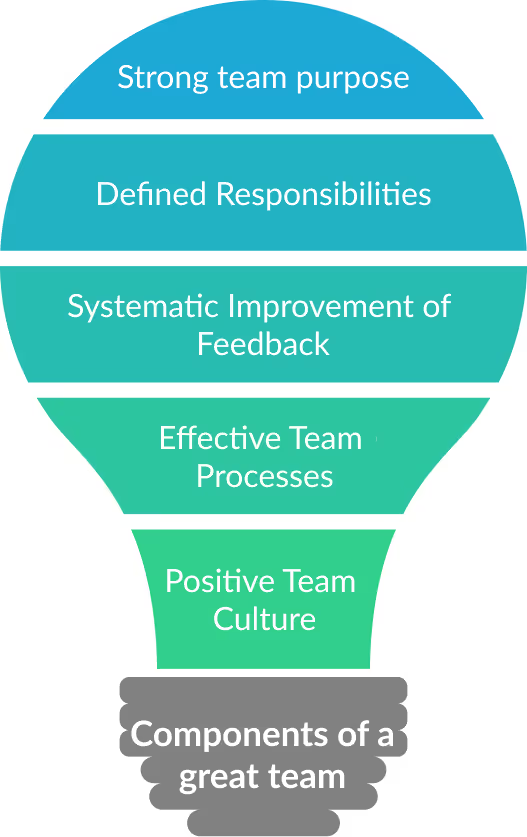“Great things in business are never done by one person, they are done by a team of people”
Effective teamwork achieves much more than any individual can! Working alone and finishing targets is easy, what is challenging is to play along with the team and succeed. There are higher chances of individual success while working alone and may also accomplish the desired results but teamwork has the potential to produce amazing results for the organization as a whole. An organization's aspirations are made true when teamwork makes the dream work.
The best role of a team is its creativity. There could be ten different people in a team with ten different ideas. And it is to be accepted that creativity thrives only when people with different mindsets work together.
Components of a Great Team
A high-performing team must include a few components. Regardless of the current status of your team, all of these things can be easily addressed. Determine which ones require the greatest attention and prioritize them. Teamwork makes the dream work, and here's the components of a great team.
1. Strong Team
Having a distinct team vision is likely the most crucial component for every team. If there is a larger organization, this might be the same as the business vision statement, but you also need a clear team vision. The goal here isn't to get too convoluted, but to pull everyone together behind a common goal - something compelling that also coincides with individual ambitions. Use straightforward language that motivates the team to work together for the greater good.
It is extremely vital for online teamwork to develop and constantly communicate a collective purpose. Because team members are frequently disconnected from the outcome of their job, they must be reminded of the purpose and the impact of their labor.
2. Defined Responsibilities
With an overarching vision in place, duties must be delineated so that each team member understands how their position contributes to the vision. Ambiguity causes tension, so avoid leaving people guessing. Explain what each person is in charge of and how their function contributes to the team's success. Knowing how their input contributes to the team's outputs can be extremely motivating.
3. Positive Team Culture
The methods in which team members interact with one another are primarily determined by the team culture and team norms that emerge over time. Team members that are supportive of one another have a positive work environment (without lowering the standards expected of each other). They are equally interested in team outcomes and are less motivated by personal goals.
How do you foster a positive team environment? If your team is quite homogenous, developing a strong team culture may come effortlessly; otherwise, you might need to put in a little more effort.
The foundation of successful team culture is mutual respect and likeability, which may be fostered by providing individuals with chances to learn more about one another. Which explains why HR departments love team-building exercises that put team members in circumstances where they must rely on one another and learn to know one another.
4. Effective Team Processes
A clear manner of working together is also required for a group of persons to become a 'dream team.' This may involve a regular (perhaps weekly) team meeting, a mechanism to communicate what everyone is working on, and a way to share what everyone is working on (eg: chat programs). Individual one-on-one sessions are also a vital aspect of a strong team approach. This is particularly helpful during the stages of team development, as members are coming together and learning to collaborate effectively.
A procedure for holding team meetings should also be established. This could include sharing individual and team "wins," discussing any problems, reviewing any tasks left over from the previous week, asking a "fun-fact" question, and making any new company announcements.
Another smart approach is a written Team Agreement. With the team's cooperation, this should be an ongoing document that is updated when new circumstances develop. It should specify things like team member expectations (hours, availability, etc.), communication style and rules, tools and instructions on when to utilize which one, and expectations for working styles. When problems occur, they can be discussed in the context of the team agreement contract, and the team can decide to make the required adjustments.
5. Systematic Improvement of Feedback
Knowing what works and what needs to be improved produces the feedback loop required by both people and teams. Maintaining motivation and wanting to go better is difficult without feedback. Feedback should come in a variety of formats, including announcements, positive peer recognition, individual performance evaluations, and regular tracking of the team's progress (perhaps on a dashboard or KPI report). Celebrating accomplishments is also an important element of developing a high-performing team.

Why teamwork makes the dream work?
“There is a saying that “Success is not about doing one thing perfectly but success is avoiding multiple possible ways that can fail“. This can be achieved only when there are people with multiple ideas working together for a common goal.

An individual might think about possibilities in a handful of and often similar kinds of ways, but only through creative brainstorming do effective solutions come out!
Teamwork makes the dream work when you consider it to be like a jigsaw puzzle, where each piece of the mind is different, but when put up together it gives out the perfect picture. Likewise, people in the team have distinctive yet complementary roles.
Creativity plays a huge role in making teamwork efficient. Also, today’s modern teamwork makes the dream work and is much more diverse, dispersed, digital and dynamic.
What can a well-built team do?
1) Ingests Creativity
A well-built team always has room for creativity and ideas. If there is a problem that comes up, a single individual might have one solution, but a team will have as many solutions as there are people in the team. Here the effectiveness, outcomes are doubled, and dreams are accomplished. Working together is much more productive than working in isolation. When one employee voices out his idea, another employee automatically starts thinking of another possible outcome and there is a chain reaction and that's what a well-built team can do for you!!
2) Compliments Strength
Teamwork is the only place that allows each and every individual’s talent to be presented on the table. Each individual is different. Each individual has his own strengths and weaknesses. A well-built team, brings everyone under one roof, and each individual is allowed to play on his strength, and the outcome of the complementary strengths of each individual is what ultimately drives them to the goal post. This also covers the right delegation of responsibilities to the right individuals. When each individual is allowed to play on his strength, he becomes responsible for it and the productivity of anything is doubled when an individual performs it with utmost responsibility and confidence.
3) On-time completion
In a team when accountability prevails, the delegation of work is automatically done and each individual is responsible for his part of work. As an individual, a person has to crack up his head to get things done with quality and on time. Many a time, if not always, either quality or deadline is compromised. But when it comes to teamwork, each person is responsible for his own part of work and quality is assured in his work and when work is delegated, the workload is spread out and on-time completion is ensured.
“Teamwork divides the task and doubles the success”
4) Always having a back
The best elements in a team are unity and trust. When there is trust in the team, it’s less likely to fall short. “Unity is strength, when there are teamwork and collaboration… wonderful things can be achieved.”
Successful teamwork makes the dreamwork and is assured when it is built on the grounds of solidarity, respect, communication, and mutual understanding. When one individual is not able to complete his part, a member takes charge and steps into his shoes bringing in more understanding towards each individual.
To ensure a seamless teamwork in times of remote working, implementation of comprehensive tools such as Mobile Device Management (MDM) solutions play a vital role in streamlining operations and BYOD management in dispersed teams.
Though teams face an enormously complicated set of challenges, a relatively small set of elements have an outsized impact on the success of the organization’s dream.
And only a shared mindset can have a perfect mix of the solution to it.
“Talent wins games, but teamwork and intelligence wins championship”
Methods for Investing in Teams
Teamwork makes the dream work, but to make the goal a reality, you must be ready to invest in teams. There are numerous methods for investing in teams. Your company's budget and time limits for other business operations will most likely influence the team-building activities you choose.
1. Team Retreats
Team retreats are an excellent opportunity to invest in teams. Typically, a team retreat takes place over the course of a weekend at a resort or other location that is specially designed for the occasion. Along with time for socializing and bonding, there will be team-building exercises and skill-building exercises. Team retreats are a terrific investment if you can afford them since you will cover every conceivable advantage of team building in one fell swoop. Companies that use team retreats typically arrange them once or twice a year.
2. Team Building Exercises
There are numerous team activities that you may undertake directly at your workplace. Team-building exercises can be incorporated into daily meetings and workplace routines. You can also plan team-building activities during off-peak business hours. Most of these exercises are low-cost and simple to execute for managers or in-house trainees.
3. Seminars for Team Building
Another way to invest in teams is to attend team-building seminars. Fewer people often participate in team seminars and more speakers present tips and strategies for collaborating more successfully. Team seminars can be beneficial, however, they are generally ineffective when compared to other team-building exercises.
4. Team Competitions
Team competitions may occur in addition to routine daily activities. They are the most economical since you don't have to spend a lot of money on prizes, you don't have to pay staff extra hours to participate in events, and you don't lose any productivity during working hours. There are numerous competitions in which teams could compete, pitting departments or smaller teams against one another.
5. Team Sports
Another approach to see how teamwork makes the dream work is through team sports. You can divide your departments into different teams, or you can get other companies to participate in a tournament-style series of games. When following this way, softball is frequently the sport of choice. Team sports are an excellent alternative since they are enjoyable, can be done after work hours, may be done on a volunteer basis so that employees are not paid for their involvement, and encourage people to cooperate and develop ties.
6. Enhancing Team Leadership
Only a great team leader can make the dream a reality. If you're a manager who has attempted a variety of team-building exercises but still isn't obtaining an effectively run department, you may need to look at your own habits and policies to determine if adjustments need to be made. Self-reflection isn’t as easy as it seems, but there are ways to get there. Consider reaching out to peers in similar roles for insights or leverage a performance AI that supports the development of visionary leadership skills in your team. They can pinpoint areas for improvement, empowering you to lead your team more effectively.
FAQs
Why is teamwork essential in the workplace?
Teamwork fosters collaboration, creativity, and accountability. When people work together toward shared goals, they solve problems faster, learn from one another, and build a stronger, more supportive work culture.
How does teamwork improve productivity?
Teamwork distributes workloads, leverages diverse skills, and reduces bottlenecks. It enables faster decision-making and ensures that tasks are completed more efficiently—especially in cross-functional or deadline-driven environments.
What are the key elements of effective teamwork?
Successful teamwork requires open communication, trust, clearly defined roles, mutual respect, and a shared vision. Tools that support collaboration and recognition also play a vital role in strengthening team bonds.















































